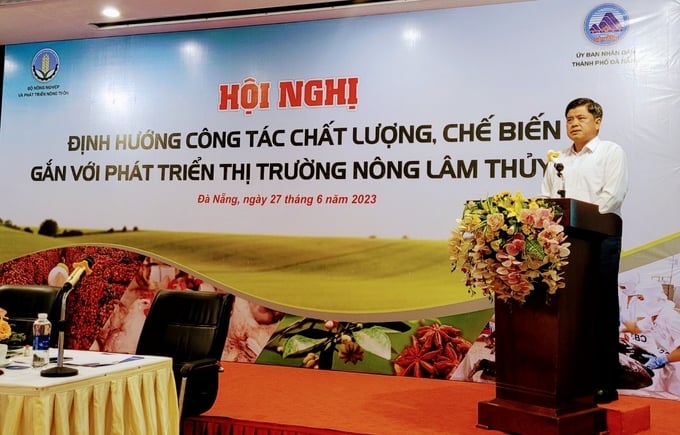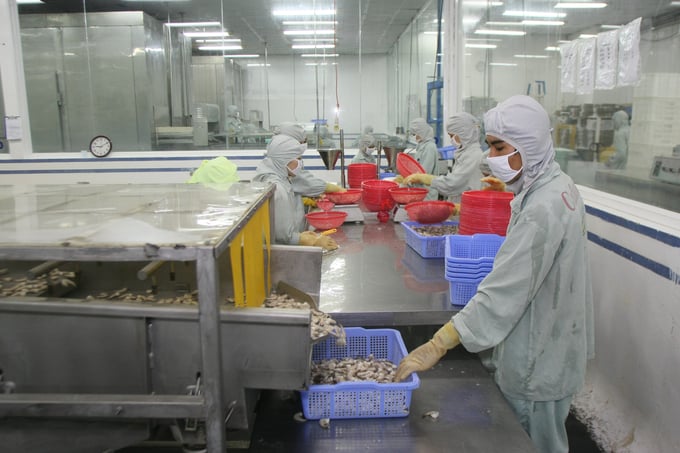May 29, 2025 | 22:27 GMT +7
May 29, 2025 | 22:27 GMT +7
Hotline: 0913.378.918
May 29, 2025 | 22:27 GMT +7
Hotline: 0913.378.918

Deputy Minister Tran Thanh Nam: “We to build linkages between production, processing and agro-product supply to ensure food safety”. Photo: TD.
On June 27 in Da Nang, the Ministry of Agriculture and Rural Development (MARD) held a conference "Orienting work on quality and processing associated with the development of the agro-forestry-fishery market".
Ngo Hong Phong, Deputy Director of the Department of Quality, Processing and Market Development, said that the prevention and control of the COVID-19 epidemic in the 2021 - 2023 period faced many difficulties. However, the MARD had focused on directing and perfecting mechanisms and policies on food quality and safety. The implementation was organized synchronously in the direction of administrative reform, suitable to reality, creating favorable conditions for enterprises to invest in agro-forestry-fishery production and business in line with international standards.
Particularly in the processing industry, Deputy Director Phong said, “Agro-forestry-fishery processing establishments in our country are quite large in number, but the processing remains in medium and low level. Processing heavily depends on the crop, so most factories have not operated at full capacity. Sometimes the market has not fully consumed the products during the crop, resulting in a situation of good harvest, bad price".
According to a report by the Department of Quality, Processing and Market Development, Vietnam currently has approximately 13,000 agro-product processing establishments, including 614 concentrated slaughterhouses, 5,229 gathering, preliminary processing and processing establishments for agro-forestry-fishery products (multi-sector), 3,369 preliminarily processing and processing establishments of plant origin products, nearly 4,000 preliminarily processing and processing establishments of terrestrial animal origin products.
Due to the high dependency on crop characteristics, the processing industries have to diversify their products according to the seasons and often do not operate at their design capacity (rice 55 - 60%, coffee 84%, vegetables 56%, tea 40%, cashew 80%, sugar cane 73%, pepper 56%). The rate of deep processing and processing shows certain limitations: Deeply processed coffee accounts for only approximately 15%, processed vegetables and fruits 10% (the rest is consumed fresh), and deeply processed cashew and pepper 10 - 15%.
In the period 2017 - 2022, 76 large projects on agro-product processing have been initiated with an investment capital of over VND 73,000 billion. Many establishments have been built and put into production, thus showing the level of investment interest and development trend of the processing industry in recent years.
According to Deputy Director Phong, the development of the agro-forestry-fishery market still has many shortcomings and limitations in terms of ensuring food safety, increasing processing to improve product quality.
Statistics show that only 10-15% of the output of key products and specialties maintains quality control and food safety at each production stage and throughout the chain. The horizontal linkage between the production households as well as the vertical linkage with the purchasing, preliminary processing, slaughtering, processing and trading establishments is considered very loose and unsustainable.
The supply chain of safe and quality food has developed quite quickly but soon exposed its limitations. Post-harvest losses are still large, generally range from 10-20% depending on the industry. Logistics in agro-product processing and consumption is still lacking and weak in capacity, unable to meet the requirements of different industries and markets.

The total processed seafood products reach approximately 3 million tons/year, equivalent to 6 million tons of raw materials. Photo: Huy Hung.
At the conference, enterprises shared their view on the current situation. A representative of MM Mega Market Vietnam said, “Not only developing the quality of processing, we should also pay more attention to post-harvest preservation because our agro-products are very characteristic in terms of the season”.
Hoang Thanh Huong, a representative of WinCommerce Company proposed some solutions. “The State needs to have policies and solutions to invest in agroproduction in a more fundamental way. It is essential to have more policies to encourage farm households to do agriculture, as well as developing appropriate policies so that farmers and businesses can deeply invest to increase productivity”.
Concluding at the conference, Deputy Minister of Agriculture and Rural Development Tran Thanh Nam said: “Production, food quality and safety, processing and market, these four stages must be linked together. The Department of Quality, Processing and Market Development and other related units should continue to advise the Ministry of Agriculture and Rural Development on these four issues. Building a chain is not only about quantity but also quality. We need to build a production - processing - agro-product supply link chain in a way that ensures food safety and market standards”.
Translated by Samuel Pham

(VAN) The mutual export of agrifood products between the European Union (EU) and the United Kingdom (UK) must occur again without certification, border controls or other red tape. This was agreed at the UK-EU summit.
/2025/05/22/5121-2-173645_677.jpg)
(VAN) NBSAP Tracker identifies strengths and areas for improvement in the National Biodiversity Strategy, based on each region’s priorities and capacities.

(VAN) The draft amendment to the Circular on rice export trading stipulates a periodic reporting regime for rice exporting enterprises.

(VAN) Dong Thap farmers attained an average profit margin of 64% during the summer-autumn 2024 crop (first season), while An Giang and Kien Giang farmers followed with 56% and 54%, respectively.

(VAN) As a doctoral student doing research on renewable energy and electrification at Harvard University, the author shares his musings on electricity, nature, and countryside memories.

(VAN) The decree on Extended Producer Responsibility (EPR) ensures transparent management and disbursement of support funds, avoiding the creation of a “give-and-take” mechanism.

(VAN) Hue City rigorously enforces regulations regarding marine fishing and resource exploitation, with a particular emphasis on the monitoring of fishing vessels to prevent illegal, unreported, and unregulated (IUU) fishing.